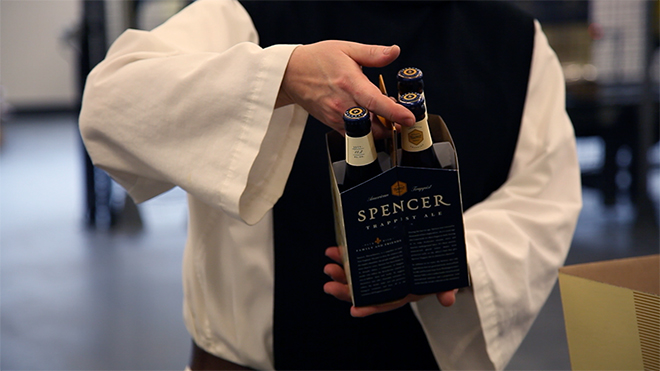Here’s a way to satisfy your sweet tooth and support religious life at the same time.
Lenten Campaign 2025
This content is free of charge, as are all our articles.
Support us with a donation that is tax-deductible and enable us to continue to reach millions of readers.
Americans spend an average of $1,200 per person a year on beer. Their neighbors to the north spent a cumulative total of $22.1 billion on alcohol in 2016.
If you choose your beer and alcohol wisely, some of that money could end up in the hands of religious communities.
The same is true of a host of other products: olive oil, cheese, and candy, just to name a few. You just have to know where to shop.
Beer, wine and spirits
Monks became brewers in the 6th century when St. Benedict of Nursia wrote the rule for his community and decided that his monks should support themselves by the work of their hands and donate to the poor whatever money they raised. Beer factored in quite nicely: They could make it themselves and it was something to share with weary travelers and pilgrims who came to them.
Today there are 11 beers around the world that are still produced in Trappist monasteries and help fund charity and social work for people in need. One of those is Spencer Trappist Ale produced by the Trappist monks of St. Joseph’s Abbey in Spencer, Massachusetts. There are also six Trappist beers brewed in Belgium, two in Holland, one in Italy, and one in Austria.

If wine is more your style, visit Italy. In Vitorchiano (Province of Viterbo), Trappist sisters produce two white wines: Coenobium and Coenobium Ruscum. Both are table wines that are made of a blend of Trebbiano, Malvasia, and Verdicchio grapes.
For hard liquors and spirits, the Benedictine monks of Portugal have you covered. At the Monastery of Singeverga, close to Braga, monks produce a digestif made from the aromatic herbs grown in their gardens. The recipe is secret, and the monks claim their liquor is the best monastic liquor available. To buy it, you need to visit their monastery or look for it in certain Portuguese supermarkets.
Cheese, olive oil, and honey
Not everyone drinks beer and wine, but everyone does need to eat. Religious communities around the world produce staples that most people use in their kitchens on a daily basis.
In Crozet, Virginia, the Trappist sisters of Our Lady of the Angels produce a mild, Dutch-style gouda cheese made from milk of grass-fed cows. While you cannot buy the cheese on their web site, you can order your Monastery Country Cheese by mail or visit the convent in person.
Nearly every region that produces olives has one religious community making and selling olive oil. In Italy the wine-making Trappist sisters of Vitorchiano also make and sell olive oil.
On the other side of the Atlantic — close to Silicon Valley — the Dominican Sisters of the Mission of San Jose produce olive oil from their mission-era olive trees. Because production is affected by weather during the growing season, the sisters are not able to sell to the public every year. When they do, you can buy a single bottle or a case, via e-mail.
Just outside Squamish, British Columbia, in Canada, the Dominican Sisters at Queen of Peace Monastery produce raw, unpasteurized honey (a rare find in Canada). They also produce candles, and soap, and make made-to-order prayer benches out of wood from the Canadian forests.
Chocolate, fudge, and other goodies
Who doesn’t like a good treat now and then? Religious communities have been providing those as long as anyone can remember.
In Amity, Oregon, the Brigittine Monks at the Priory of Our Lady of Consolation make and sell gourmet fudge and truffles. The treats are sold in select shops on the West coast and can be ordered online.
In Alcala de Henares, close to Madrid, Spain, the Poor Clares of St. Diego make and sell “Almendras de Alcala” or “Alcala Almonds.” The sugar coated almonds can be purchased at various bakeries in the city of Alcala, or you can buy straight from the convent through the cloister grate.
The Trappist monks of the Abbey of Val Notre-Dame became famous when they lived in Oka, Quebec, and produced an eponymously named cheese. Demand for the cheese grew so much that it threatened to take over their monastic life. The monks sold the cheese making business to a local company and moved to a smaller monastery where they still produce jam, honey, caramel and chocolate — all of which can be ordered online.
At least two websites are dedicated to selling products made by religious communities. In Spain, hechoenelconvento.com sells products produced by five different convents in Seville, Spain.
Meanwhile, in France, the website artisanatmonastique.com serves as an online boutique for products made by convents and monasteries in France and Belgium.










